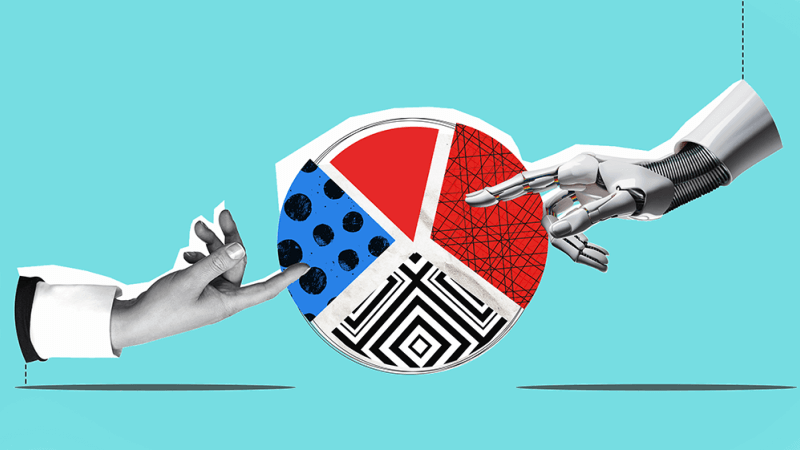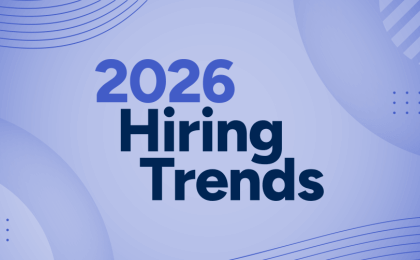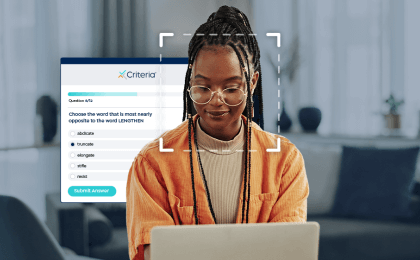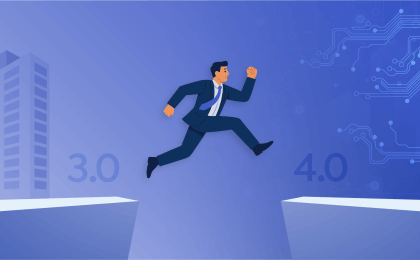Artificial intelligence is rewriting the rules of hiring. The question for HR teams isn’t if AI will transform recruitment; it already has. The challenge now is how to balance the efficiency of technology with the irreplaceable value of human judgement and empathy.
At Criteria, we believe the future of hiring lies not in choosing between humans and machines, but in integrating both to create fairer, more inclusive, and more predictive hiring practices.
From Credentials to Capabilities
For years, employers have relied on degrees, resumes, and work history as the primary signals of talent. But in a rapidly changing world, those markers are losing relevance. The World Economic Forum predicts that by 2030, nearly 40% of core workplace skills will be obsolete (WEF, Future of Jobs Report, 2023). What truly matters is a person’s capacity to adapt, learn, and grow.
The rise of skills-based hiring reflects this shift. More than 50% of companies now prioritize skills over degrees, and one in five have removed degree requirements altogether (Criteria, 2025 Hiring Benchmark Report). Work 4.0, the new era of work, demands that employers move from asking, “What have you done?” to “What can you become next?”
Recruiters who focus on capability rather than credentials are not just widening their talent pools, they’re building more resilient teams ready for an uncertain future.
The Resume Is Dead (and That’s a Good Thing)
Today, LinkedIn alone processes over 11,000 job applications per minute, and by 2028, 25% of all applications are expected to be AI-generated (LinkedIn, Global Talent Trends, 2024). As candidates use AI tools to polish, tailor, or even enhance resumes, it’s become harder to separate authenticity from automation.
But AI is also the solution. Modern tools can help recruiters look beyond surface-level data to evaluate genuine skills and potential. Predictive assessments, structured interviews, and ethically built AI evaluations reveal the human being behind the paper. When data enhances insights about a candidate, hiring becomes both smarter and more human.
AI as a Tool, Not a Threat
Many employers still feel uneasy about AI’s role in hiring, fearing bias, privacy issues, or loss of human touch. Yet when designed and deployed ethically, AI can enhance fairness and efficiency rather than diminish them.
According to the 2025 Hiring Benchmark Report, 61% of hiring professionals feel optimistic about AI’s potential to improve recruitment outcomes, and 79% say their employees are open-minded about AI use. Trust is growing, and so is AI literacy.
At Criteria, we advocate for a framework of Ethical AI in Recruitment built on five principles:
- Scientific Standards: Use tools backed by validated, peer-reviewed research.
- Bias Mitigation: Actively detect, address, and report bias.
- Transparency: Explain what the AI does, why it’s used, and how it works.
- Candidate Consent: Be open when AI plays a role in evaluation.
- Human Oversight: People make the final decisions.
When organizations follow these principles, AI becomes an ally in equity, helping reveal hidden potential and levelling the playing field for diverse candidates.
The Myth of the Talent Shortage
Many employers say they’re struggling to find quality candidates, but the reality is that talent isn’t missing – it’s hiding. Traditional filters, specific degrees or work history, can obscure candidates who have the right skills but have lived a different story.
By rethinking hiring through a skills-based, data-informed lens, organizations can uncover untapped potential. This might include evaluating personal projects, group simulations, side hustles, volunteering, or self-taught skills, all of which showcase initiative and capability.
The best talent is often just beyond the limits of old hiring habits.
Work 4.0 and the Human Advantage
As automation accelerates, the most valuable workplace skills are becoming the most human. Emotional intelligence, empathy, communication, and adaptability, also referred to as “soft skills”, are now critical differentiators.
At Criteria, we see four key human capabilities shaping the future of work:
- AI Literacy: Understanding how to work effectively with technology.
- Empathy: Building trust and connection across digital spaces.
- Communication: Expressing ideas clearly in distributed teams.
- Adaptability: Thriving amid change.
These skills drive engagement, innovation, and long-term success – and they’re exactly what structured, science-backed assessments are designed to measure.
Predictive Science in Action
When used responsibly, data makes hiring not only more effective but more human. Predictive assessments, grounded in organizational psychology, evaluate how candidates think, communicate, and problem-solve, giving every applicant a fairer opportunity to succeed.
AI can now support interviews by generating structured questions, summarizing responses, and even suggesting objective scoring frameworks. Importantly, humans remain the ultimate decision-makers, using technology to inform – not replace – their judgement.
Research shows that structured interviews are twice as predictive of job performance and 28% less biased than unstructured interviews (Sackett, et al., Annual Review of Organizational Psychology and Organizational Behavior, 2022; Fast, Fair & Functional – Lighthouse Advisory, 2023). Candidates also appreciate the consistency and transparency these methods provide, with 80% reporting positive experiences in structured video interviews (Criteria, Candidate Experience Report, 2023).
A Shared Responsibility
The move to AI-augmented hiring isn’t just a technical change; it’s a paradigm shift. Employers must be transparent about how AI shapes recruitment, and candidates should be educated about how it supports fairness and integrity.
When applied thoughtfully, AI actually restores the humanity of hiring by freeing recruiters from repetitive screening tasks so they can focus on what matters most: connection, growth, and culture fit.
Looking Ahead
Employers stand at a defining moment. AI is reshaping the rules, but the heart of hiring remains the same: finding people with the skills, curiosity, and humanity to thrive.
By blending science with empathy and data with discernment, we can build a future of work that is fair, inclusive, and purpose-driven.
At Criteria, our mission is simple: to help organizations find and grow great talent through science-backed, human-centered technology. Because when we hire with both intelligence and empathy, we don’t just fill jobs – we unlock potential.





